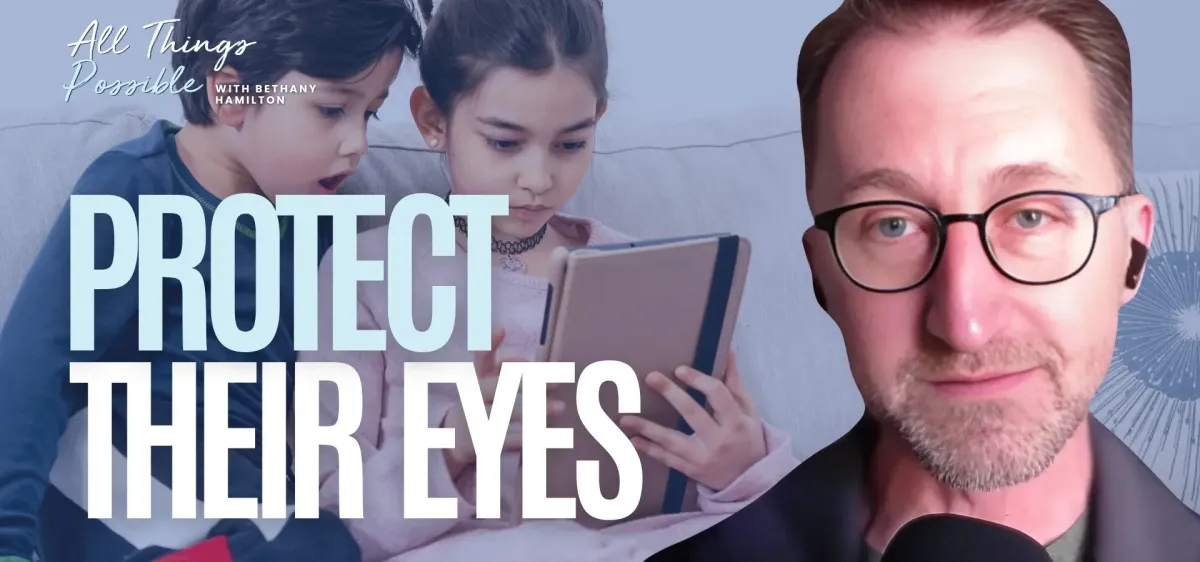Protect Their Eyes
19.18.2025

As parents, we all feel it—the world our kids are growing up in looks drastically different than the one we knew. The pressure, the comparison, the constant screen time—it’s heavy. Adam and I recently had another powerful conversation with Chris McKenna from Protect Young Eyes, and this time we dove deep into the challenges teenage girls are facing with social media.
And let me tell you, this conversation was eye-opening, heartbreaking, and filled with both truth and hope.
Chris shared research that shows how, after 2012, the well-being of young people—especially girls—started to plummet. We’re seeing staggering increases in anxiety, depression, and self-harm. And what was happening in 2012? That’s the same time social media use exploded.
Girls, in particular, are deeply relational. They long to feel connected, seen, valued, and loved. God designed them this way, but when those good desires are poured into disembodied digital platforms, the result is often harmful. Social media gives the appearance of connection, but it’s not real connection. Just as pornography masquerades as intimacy for boys, social media masquerades as connection for girls. And instead of feeding their hearts, it leaves them emptier, hungrier, and more insecure.
Chris put it this way: “Social media whispers, ‘You’re not enough. You’re not pretty enough. You’re not valuable enough.’”
And friends, I feel that. Even as a grown woman, I still sometimes hear those whispers when I scroll. I can only imagine how much louder and more confusing those lies are for a 13-year-old girl trying to figure out who she is.
But here’s the truth we have to cling to:
“But you are a chosen race, a royal priesthood, a holy nation, a people for his own possession, that you may proclaim the excellencies of him who called you out of darkness into his marvelous light.” (1 Peter 2:9, ESV)
Our identity is found in Christ—not in likes, follows, or filtered selfies. And that’s the message our daughters need to hear and see lived out.
Do We Just Say No to Social Media?
This is the hard question parents are wrestling with. Do we cut it off entirely? Do we wait until they’re older? Chris made it clear: there is no research that delaying social media harms a child. None. In fact, the risks of introducing it too early are far greater than the risks of waiting.
That might mean saying “no” to Snapchat or Instagram until they’re 18. And yes, they may push back. Yes, they may think you’re the “mean parent.” But remember—our job isn’t to make our kids happy in the short term. Our job is to lead them toward holiness and long-term health.
Chris used this picture: If a pilot realizes he’s flying in the wrong direction, he turns the plane around—even if it’s hard, even if it means discomfort. Parents, we are the pilots of our homes. It’s our job to turn things in the right direction for the sake of our kids.
As he said so powerfully: “We are not responsible for our children’s current happiness. We are responsible for their long-term holiness.”
The Real Danger Behind the Screens
One of the most shocking parts of our conversation was when Chris shared the testimony of a former Facebook executive. She revealed that the company would actually identify when young girls were feeling worthless or deleting selfies—and then use that vulnerable moment to sell them beauty products.
Take that in for a moment. Our daughters’ insecurities are being tracked, analyzed, and exploited for profit.
Ephesians 6:12 reminds us of what’s really at stake:
“For we do not wrestle against flesh and blood, but against the rulers, against the authorities, against the cosmic powers over this present darkness, against the spiritual forces of evil in the heavenly places.” (ESV)
This isn’t just about technology. It’s spiritual warfare. The enemy wants our daughters believing lies about their worth. But God’s Word tells us otherwise, and as parents, we’re called to stand in the gap.
What Can We Do?
The good news is, we’re not powerless. Here are a few things we can do right now:
Delay social media for as long as possible. Don’t believe the cultural pressure that says kids “need” it. They don’t.
Model healthy habits. Let your kids see you putting your phone down, engaging in conversation, and choosing real connection.
Encourage in-person friendships. Research shows that strong in-person relationships can help offset some of the negative effects of social media.
Fill their hearts with truth. Keep pointing them back to God’s Word, reminding them of their unshakable identity in Christ.
At the end of the day, what our children need most isn’t another app or a carefully curated digital image—it’s love, truth, connection, and a foundation on the solid rock of Jesus.
When I was 13 and lost my arm, what carried me through wasn’t distraction on a screen. It was my faith in God and the deep connection I had with my family. That’s what gave me resilience and hope. And that’s what I pray we can give our kids in this noisy digital age.
Two Major Takeaways
Delaying social media is not harmful—it’s protective. Don’t let cultural pressure convince you otherwise. Waiting gives kids more time to develop resilience and a stronger foundation.
Social media whispers lies, but God’s Word declares truth. We must help our daughters root their identity in Christ, not in the ever-changing opinions of peers online.
More Posts Like This
View Allsubscribe now
Want To Know When New Posts Go Live?
Join my email list for new posts, stories, and Unstoppable life tools.

We’ll email you updates + exclusive early-bird access. No spam, ever.
Search The Blog
Type a word, question, or topic and we'll pull up posts that can help.
Search The Blog
Type a word, question, or topic and we’ll pull up posts that can help.
